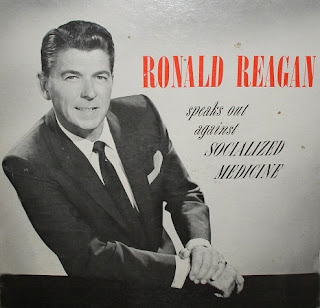Obama, McCain, and health care.

With health care reform being such an obvious issue on the minds of American voters this year, it’s surprising to me that we don’t hear more from the candidates about it. I suspect it has to do with the fact that any real, durable solution is going to be controversial. It will be good for some, bad for others, and will involve a great deal of compromise. Not exactly the kind of issue you want to build your campaign around. And so the public debate is limited to the usual meaningless sound bites. “Affordable health care.” “Access to the highest quality medicine.” “Coverage you won’t lose when you change jobs.”
As a doctor, people do ask me about the candidates’ positions and sometimes they even want to know my opinion who has the better plan. Those who know me have heard me say over and over again that the best, most cost effective, comprehensive, highest quality system is a single payer plan. I am under no illusions about the chances of this coming to pass in the U.S. But I do see it as a starting point for the debate, a model that we will need to move towards eventually.
McCain
John McCain’s health care reform ideas are largely influenced by John Goodman, an economist and president of the conservative think tank The National Center for Policy Analysis (he's the father of the Health Savings Account! Which nobody uses!). He has an amusing, little blog over here where he just sort of rants about things he appears to know a tiny bit about. The National Center for Policy Analysis describes its mission as finding “private sector solutions to public policy problems.” In addition to solving the health care problem, the NCPA also manages to find time to have position statements on affirmative action, crime, the economy, education, social security, terrorism, and welfare (these guys must be Really Smart!) Mr. Goodman’s health care credentials seem limited to a book he wrote criticizing single payer health care and he apparently has no direct experience in actual government health policy. McCain's chief domestic policy advisor is Douglas Holtz-Eakin who is said to favor free market solutions to the health care problem. And for good measure, we also have Tom Miller, resident fellow of the American Enterprise Institute, the Bush Administration's cactus league where new "talent" is developed. What's astounding to me is I could find no evidence of any actual health care experts, physicians, or patient advocates informing McCain’s health care plan.
McCain’s plan depends on market forces and individually purchased insurance to drive down costs, with government setting policies that would reward care providers on outcomes. Currently, employers who buy health insurance for their employees get to deduct the premiums they pay from the their corporate tax bill. McCain wants to eliminate this tax deduction and then use that extra tax revenue to give money to individuals in the form of tax credits, which they can then use to buy their own insurance. He expects such a credit would be $2500 for an individual, or $5000 for families.
Now, everyone knows that health insurance on the open market costs way, way more than this, at least $6000 a year for an individual and about $12000 for a family. His solution? Deregulate the industry so that individuals are encouraged to purchase much less comprehensive insurance with high deductibles and allow them to purchase insurance from any company willing to insure them, anywhere in the country.
And what about the people with complex, expensive medical problems to whom insurance companies will simply refuse to sell? He plans to create a large government-run insurance pool for those that the health care industry calls “uninsurable.”
The plan also pays lip service to improving the speed with which generic drugs are brought to market (although, one presumes not by limiting the current patent laws that protect pharmaceutical companies), improved health care technology (whatever that means), and reform of medical malpractice.
As I see it, there are several problems with this that illustrate how poorly informed McCain really is about the health care system:
1. Companies that are already doing the right thing by providing health care for their workers will be forced to subsidize those companies that aren’t. It won’t take long for most smaller employers to simply stop providing health care altogether, which is what I suspect is the idea all along. But then what happens to the revenue that is supposed to fund these tax credits?
2. It doesn’t fully fund health care. As an individual, you will still, conservatively need to cough up $3500 and the bill will still go up 5 to 10 percent a year. And most people who are uninsured now will simply remain uninsured because the cost is still far too high for them. Many of those who use the tax credit will likely purchase inexpensive bare bones policies with super high deductibles, which is little better (from a primary care perspective) than no insurance. I can tell you, it is extremely difficult to treat something as simple as hypertension when your patient tells you “Doc, I can only afford to come see you once a year.”
3. For the most difficult, costly patients who have the greatest need, he’s basically proposing a government administered single payer program, which absolutely blows my mind. I mean, god forbid we have government involved in health care, unless of course you are actually sick and need health care, then it's fine. Now, a normal person might think if it’s good enough for the people who are going to use it the most, why not make it more cost effective by including more healthy people? Hell, you could even prevent some of those cheap healthy people from becoming expensive sick people by getting them steady access to primary care. I guess you'd have to be a normal person to think like that.
4. The “cost savings” of the plan relies on competition within the individual insurance market even though that is typically the most expensive segment of the health insurance market, one that involves individual underwriting and exclusion of pre-existing conditions.
5. The single biggest piece of most physicians’ overhead is that which is devoted to administering the insurance system. I contract with 15 different insurance plans and it requires almost 2 full time employees to send those bills, chase after bills that get denied, collect co-pays, change prescriptions every time one of those insurance companies gets a new formulary, and make sure my credentialing is current with each company. I shudder to think what would happen in a deregulated insurance market, where patients come to me with hundreds of different insurance plans, each with their own package of benefits. Certainly, many primary care physicians would choose to abandon insurance contracts at all and go to a strictly cash out of pocket business. Again, this may be the plan all along.
Obama
Obama’s top health care advisors include David Cutler, a professor of applied economics at Harvard who has years of health policy experience and who helped craft Bill Clinton’s health care reform plan, David Blumenthal, a practicing physician, professor of medicine at Harvard, former vice president of Brigham and Women's Hospital, former director of the Center for Health Policy at the Kennedy School of Government (his resume includes minor things like correspondant for the New England Journal of Medicine, sitting on the advisory committee for the National Academy of Sciences), a man who has more than 20 years’ experience writing about health policy and reform, and Stuart Altman, a health care economist who helped develop health policy for Richard Nixon, Bill Clinton, and John Kerry. 2 of the three are from Massachusetts, a state that has implemented its own, generally successful, universal health plan. Say what you want about Clinton's reform attempt or the Massachusetts plan, but these are people who are well known and respected in the health care field who have spent their careers researching and thinking about this stuff.
Obama’s plan is a standard “play or pay” plan. Employers would be required to provide health insurance or they would pay into a fund that would create a new national health plan, similar to Medicare. In addition, for those that would prefer private insurance to a government-run plan, he would establish a new national health exchange that would allow small businesses and individuals to purchase insurance as part of a large pool, similar to what several states are doing successfully now.
Under Obama’s plan, there would be a mandate that all parents must purchase insurance for their children but it stops short of mandating all adults participate for the time being (this was the key difference between Obama and Clinton’s proposal).
Obama also plans to increase regulation of the insurance industry to end risk rating based on health status and to create a new system of reinsurance whereby the federal government would subsidize employers for costs incurred by catastrophic medical cases, protecting the remaining pool of insured persons from these cases.
Like McCain, Obama’s plan also has statements about driving down costs but his proposals are much more specifically friendly to primary care. He would do this through the adoption of electronic records, promotion of chronic disease management, emphasis on prevention and public health, payment to providers on the basis of performance and outcomes, all ideas that bring us closer to achieving the Future of Family Medicine’s proposed medical home.
It is not entirely clear how Obama’s system is going to be funded. He proposes a combination of allowing certain tax cuts to expire, reduced administrative expenses, and savings from improved prevention and disease management. I think we are likely to get a system that costs as much as what we are currently paying, but one that is much more comprehensive, leaves fewer uninsured, and serves the needs of ordinary people much better that what we currently have. Employers want to get out of the business of providing health care and this proposal will give them a path to do exactly that. And this may move us all much closer to a single payer system. For the time being it preserves the health insurance industry and maximizes individual choice.
It would be naïve to think that either candidate is simply going to pass whatever reform plan they want in their first days in office; our political system simply doesn’t work like that. The president merely dictates the direction and tone of the debate. When you read the candidates’ health care proposals, it doesn’t tell you so much about what they really are going to do, rather it gives you insight into how the candidate and his advisors think about the problem and their vision for the future.
With that in mind, I’m throwing my lot in with Obama’s team. His plan prioritizes the needs of patients and primary care over that of insurance companies and employers. He’s listening to the right people, and his plan builds on previous successes. McCain recklessly proposes that the entire country adopt an untested insurance paradigm, one that seems guided by conservative economic ideology and not actual real-world experience. I am convinced that there will be another real attempt at health care reform during an Obama presidency, hopefully this time with real results.
Reagan speaks out against health care reform and the fact that it will inevitably lead to a communist takeover of America.

Comments